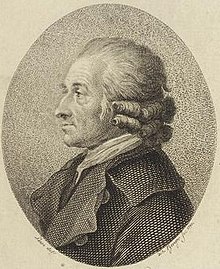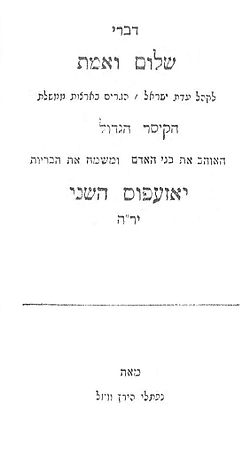Naphtali Hirz Wessely
This articleneeds additional citations forverification.(June 2024) |
Naphtali Hirz Wessely | |
|---|---|
 | |
| Born | 9 December 1725 Hamburg,Holy Roman Empire |
| Died | 28 February 1805(aged 79) Hamburg, Holy Roman Empire |
| Literary movement | Haskalah |
Naphtali Hirz(Hartwig)Wessely[note 1](Yiddish:נפתלי הירץ וויזעל,romanized:Naftali Hirtz Vizel;9 December 1725 – 28 February 1805) was aGerman-JewishHebraistandeducationist.
Family history
[edit]One of Wessely's ancestors,Joseph Reis,fled fromPodoliain 1648 on account of theChmielnickipersecutions, during which his whole family had perished. After a brief sojourn inKraków,Reis settled inAmsterdam,where he acquired great wealth, and where he, in 1671, was one of the signers of a petition to the Dutch government requesting permission to erect a synagogue. Together with his younger son Moses (Naphtali Hirz's father), Reis later settled inWeselon theRhine,whence the family name "Wessely" originated. In the synagogue at Wesel (destroyed duringKristallnacht) preserved some ritual paraphernalia presented to it by Moses Reis Wessely, who, upon the advice of the Prince ofHolstein,whose purveyor he was, removed toGlückstadt,then the capital ofSleswick.He established there a factory of arms. KingFrederick VI of Denmarklater sent Moses toHamburgas his agent, and while there he transacted important business forPeter the Greatas well. Moses' son, Issachar Ber Wessely, was the father of Naphtali Hirz.
Biography
[edit]Naphtali Herz Wessely passed his childhood atCopenhagen,where his father was purveyor to the king. In addition to rabbinical studies underJonathan Eybeschütz,he studied modern languages. As the representative of the banker Feitel, he later visitedAmsterdam,where he published (1765–66) hisLebanon,orGan Na'ul,a philological investigation of Hebrewrootsand synonyms. Although prolix in style, and lacking scientific method, this work established his reputation. After his marriage at Copenhagen, he represented Feitel at Berlin, and there became associated withMoses Mendelssohn.Wessely encouraged the latter in his labors by publishingAlim li-Terufah,a work advocating thebi'urand the translation of the Bible into German. To this work Wessely himself contributed a commentary onLeviticus(Berlin, 1782), having published, two years previously, a Hebrew edition of theBook of Wisdom,together with a commentary. He died in Hamburg on 28 February 1805.
His son was the composerKarl Bernhard Wessely.
Works
[edit]
Wessely was an advocate of the educational and social reforms outlined inEmperor Joseph II'sToleranzedict.He even risked his reputation for piety by publishing a manifesto in eight chapters, entitledDivrei Shalom ve-Emet('Words of Peace and Truth'), in which he emphasized the necessity for secular instruction, as well as for other reforms, even from the points of view of theMosaic lawand theTalmud.This work was translated intoFrenchasInstructions Salutaires Addressées aux Communautés Juives de l'Empire de Joseph II.(Paris, 1792), into Italian byElia Morpurgo(Goerz, 1793), and into German byDavid Friedländerunder the titleWorte der Wahrheit und des Friedens(Berlin, 1798). By thus espousing the cause of reform, as well as by his support of Mendelssohn, Wessely incurred the displeasure of the rabbinical authorities of Germany and Poland, who threatened him with excommunication.
His rivals, however, were finally pacified through the energetic intervention of the Italian rabbis, as well as by Wessely's pamphletsMeḳor Ḥen,in which he gave evidence of his sincere piety. In 1788 Wessely published in Berlin his ethical treatiseSefer ha-Middot('The Book of Virtues'), a work ofMusar literature.He also published several odes, elegies, and other poems. Hismagnum opusis his five-volume workShire Tif'eret(I–IV,Berlin,1782–1802; V, Prague, 1829), describing in rhetorical style theexodus from Egypt.This work, through which he earned the admiration of his contemporaries, was translated into German (by G. F. Hufnagel and Henry Spalding; 1789–1805), and partly into French (by Michel Berr; Paris, 1815). His commentaries on the Bible were published by the societyMekitze Nirdamim(Lyck,1868–75) under the titleImre Shefer.
Wessely influenced his contemporaries in various directions. As a scholar he contributed, by his profound philological researches, to the reconstruction of the language of the Bible, though his work is marred by prolixity and by his refusal to admit shades of meaning in synonyms. As a poet he possessed perfection of style, but lacked feeling and artistic imagination. No one exerted a greater influence than he on the dissemination of modern Hebrew, and no one, on the other hand, did more to retard the development of pure art and of poetic intuition. Because of his energetic commitment to the cause of Jewish emancipation, Wessely may be regarded as a leader of theMaskilim.
Wessely also wrote a commentary onPirkei AvotentitledYein Levanon,which was highly regarded inMusarYeshivas.[1]
Commemoration
[edit]Weisel Street in Tel Aviv is named after Naftali Hertz Weisel (Wessely)[2]
Notes
[edit]References
[edit]![]() This article incorporates text from a publication now in thepublic domain:Singer, Isidore; Slouschz, N. (1906)."Wessely, Naphtali Hirz (Hartwig)".InSinger, Isidore;et al. (eds.).The Jewish Encyclopedia.Vol. 12. New York: Funk & Wagnalls. p. 506–507.
This article incorporates text from a publication now in thepublic domain:Singer, Isidore; Slouschz, N. (1906)."Wessely, Naphtali Hirz (Hartwig)".InSinger, Isidore;et al. (eds.).The Jewish Encyclopedia.Vol. 12. New York: Funk & Wagnalls. p. 506–507.
- ^Moshe, Maimon (January 28, 2020)."Uncovering Mussar's and Chassidus' Divergent Approaches Toward Enlightenment"(PDF).Ḥakirah: The Flatbush Journal of Jewish Law and Thought.Flatbush, Brooklyn, New York: 218. Archived fromthe original(PDF)on August 1, 2014.
- ^"Tel Aviv Streets Guide"(PDF)(in Hebrew).
External links
[edit]![]() Media related toNaphtali Hirz Wesselyat Wikimedia Commons
Media related toNaphtali Hirz Wesselyat Wikimedia Commons
